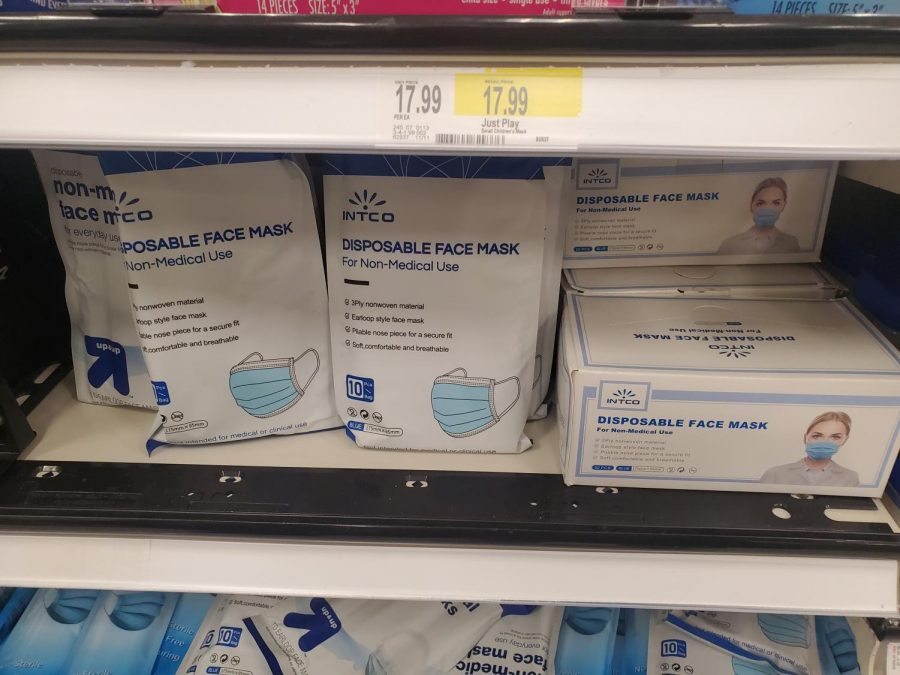Unmasking the Mask Conspiracy Theories
Face masks used to combat COVID-19 transmission are currently sold by large retail chains throughout the United States.
Since the very beginning of the Coronavirus pandemic, people have been reluctant to wear masks for seemingly pointless reasons. The idea of wearing face masks has not been an easy one to accept for some people; some individuals wear masks without question, while others are a bit more hesitant to wear a simple cloth covering over their face when they go outside.
Myths and conspiracies behind the new standard have spread like wildfire, unfortunately amassing quite the following behind them. Here are some, and the reasoning behind their debunking.
Not experiencing symptoms of COVID-19 excuses you from the mask mandate. This is absolutely false, as research has proven that COVID-19 is about as unsuspecting as viruses get, with many positive testing cases having had no visible symptoms prior. This means that if you have been infected, and likely do not know, and leave your house without a face covering, there is no telling just how many people you endanger, just by breathing. Here is the CDC’s list of COVID-19 symptoms, and another list on the asymptomatic nature of COVID-19.
Masks actually make you sick. Again, this is a false statement. Try telling this to the many doctors and surgeons who have been wearing them daily for much longer than just now. This myth says that the mask traps carbon dioxide inside of it, causing you to inhale it instead of oxygen. Here is an article behind the science of CO2 poisoning, and how most masks will not allow for that to happen. Masks do, however, sometimes fog up your glasses if you wear them. But this is not a reason to not wear a mask. I myself wear glasses, and this issue is usually solved by pinching the bendable metal band on the nose, so that your breath diffuses through the mask, and not by escaping out of the top of the mask.
Wearing a mask means that I do not need to maintain social distancing. Slowing the spread of COVID-19 does not end with mask wearing. Social distancing should be maintained at all times, especially in areas with high concentrations of people. Not taking all precautions to avoid contracting and/or spreading COVID-19 is essential, or people will suffer from it. It is not a substitute for social distancing, as the CDC states.
Of course, there will be the doubters, people who simply believe that the government and all its experts are out to get them. Soon to be former President Donald Trump, at the start of the Coronavirus pandemic, did not take the threat seriously, going as far as to tweet about the “fake news” surrounding the virus that was supposedly less deadly than the flu, according to him. His conflicts with Dr. Fauci over the death tolls and the new vaccine do little to ease worries. He was only first seen wearing a mask in public starting on July 11th, 2020, despite having declared COVID-19 a national emergency all the way back in March 2020.
However, per the CDC’s guidelines, there are people who should be exempt from mask wearing. These people include children under the age of two, people who cannot wear a mask because of sensory, cognitive, or behavioral issues, or the hearing impaired, or someone who cannot remove the mask without assistance. And in the cases of people with chronic respiratory issues, going outside is simply not advised. Dr. Rizzo, chief medical officer for the American Lung Association, told a reporter at ABC News, that “people with supplemental oxygen or compromised respiratory status who become short of breath even when walking might meet criteria. In these cases, going out in public is a health risk to the person.”
There are different kinds of masks that you can purchase. A surgical mask is a disposable, single use covering. N-95 masks are more effective than surgical masks; however, the FDA does not recommend the public use them, as supply is limited and needed for the safety of health care workers. You can also get a reusable face mask, which can be tossed in with your other laundry after being used. Some masks are more effective than others, but in truth, wearing any face covering is better than wearing none.
The purpose of masks is to protect others from you. And by not wearing one, you actively endanger anyone who comes into contact with you. Ultimately, you have to choose between your comfort and other people’s safety and lives. “If you don’t wear a mask you are actively endangering your community and yourself,” said Alfred Shou ’23.
For more information regarding the purpose of mask wearing along with some ‘dos and don’ts’, the CDC offers more guidance on their webpage, found here, with many scientific studies already conducted and published as well, such as the three listed below:
- Particle Removal Efficiency of Fabric Masks vs. Standard Surgical Masks for PPE
- Filtration Efficiency, Breathability, and Reusability of Improvised Materials for Face Masks
- Effectiveness of Common Fabrics to Block Aqueous Aerosols of Virus-like Nanoparticles
“If you don’t wear a mask you are actively endangering your community and yourself,” said Alfred Shou ’23.
Marina Tiligadas is a Staff Reporter for 'The Science Survey' where she seeks to inform and spread awareness of current events. Outside of school, Marina...











